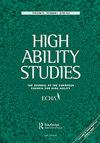“别担心,要快乐”:资优学生的悲伤幸福状态研究
IF 1.8
4区 教育学
Q2 EDUCATION, SPECIAL
引用次数: 13
摘要
在现代社会,获得幸福被认为是一个高价值的目标,与多种积极的结果相关。大多数关于资优学生的文献都集中在认知结果上,对积极心理结构的研究很少。本文的主要目的是从积极心理学的角度来研究与资优学生的幸福感相比,资优学生的幸福感的经验证据。这项研究的方法是基于对六项现有研究的小规模荟萃分析,这些研究提供了不同教育群体幸福感差异的实证数据。这六项研究共包括1632名参与者(平均比例男性= 53%),包括713名天才学生(61%的男孩)和919名身份不明的学生(47%的男孩)。总的来说,这项研究未能揭示受教育群体在幸福感方面的平均可靠差异,这支持了天赋更多是一种保护资源而不是脆弱因素的观点。未来的研究方向,在这个相对被忽视,但重要的,研究领域提出。这篇论文的结论是,那些快乐并觉得自己在为更大的利益和改善生活做出贡献的天才学生,也更有可能茁壮成长,最终对自己和整个社会都有好处。本文章由计算机程序翻译,如有差异,请以英文原文为准。
“Don’t worry—be happy”: The sad state of happiness research in gifted students
ABSTRACT Achieving happiness is considered to be a high value goal in modern society, associated with manifold positive outcomes. Much of the literature on gifted students focuses on cognitive outcomes, with a paucity of research on positive psychological constructs. The major goal of this paper is to examine the empirical evidence bearing on the happiness of gifted students when compared to their nonidentified students from a positive psychological perspective. The methodology of this study is based on a small-scale meta-analysis of the six available studies providing empirical data on differences among educational groups in their happiness. These six studies included a total of 1632 participants (mean proportion male = 53%), comprised of 713 gifted (61% boys) and 919 nonidentified students (47% boys). Overall, this study failed to reveal mean reliable differences among educational groups in happiness, supporting the position that giftedness is more of a protective resource than a vulnerability factor. Directions for future research in this relatively neglected, yet important, area of research are presented. This paper concludes by contending that gifted students who are happy and also feel they are contributing to the greater good and improving life, are also more likely to flourish and eventually benefit both themselves and society as a whole.
求助全文
通过发布文献求助,成功后即可免费获取论文全文。
去求助
来源期刊

High Ability Studies
Multiple-
CiteScore
4.80
自引率
11.10%
发文量
7
期刊介绍:
High Ability Studies provides a forum for scholars in a variety of disciplines associated with the development of human abilities to their highest level. It is a medium for the promotion of high ability, whether through the communication of scientific research, theory, or the exchange of practical experience and ideas. The contents of this journal are unique in reflecting concerns and recent developments in this area from childhood and across the whole life span in a variety of contexts. Far from being restricted to the traditional focus on high-level cognitive development, it also presents investigations into all other areas of human endeavour, including sport, technology, the arts, business, management and social relations.
 求助内容:
求助内容: 应助结果提醒方式:
应助结果提醒方式:


